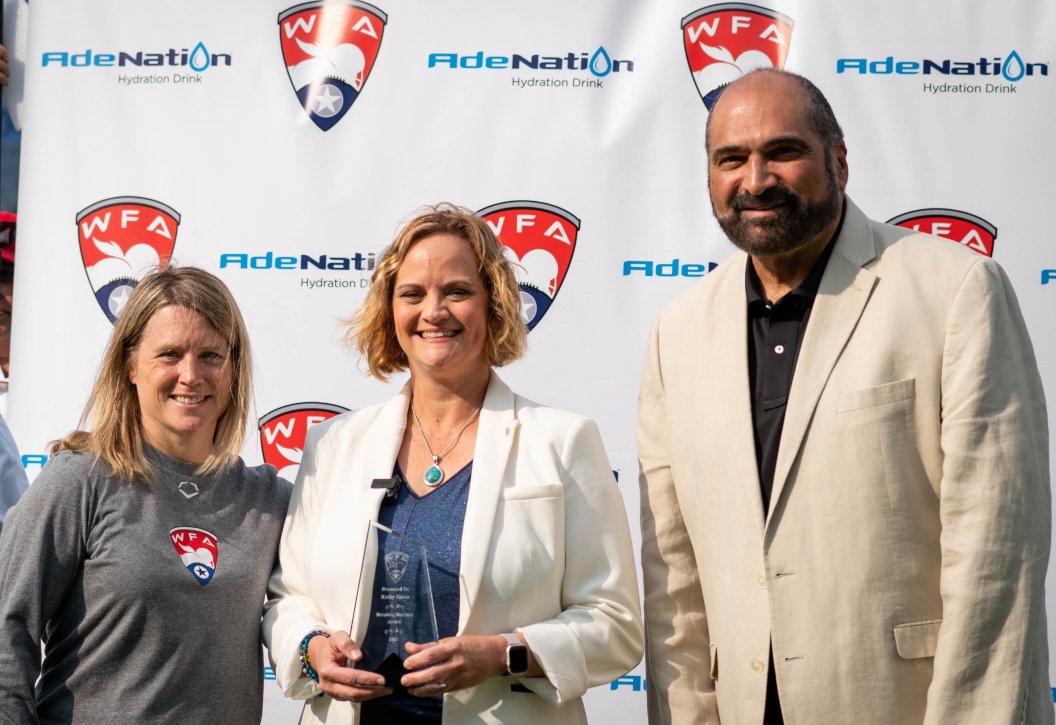Kathy Kuras uses her love of football to break barriers for the generations of young girls behind her.

By Fiza Kuzhiyil, Photo courtesy of The YMCA of Austin
Like many young girls, Kathy Kuras grew up playing tackle football with the boys in her neighborhood, just for fun. When the boys got old enough to play in the little leagues, suddenly she didn’t have a place in football anymore. Told that girls don’t play football, Kuras set aside the thought for decades. Until she met Sami Grisafe.
A USA World Champion quarterback and two-time world champion MVP, Grisafe introduced Kuras to the world of women’s tackle football. Entranced by their powerful gameplay, Kuras set out on a six-year journey to document the world of women’s tackle football in her first feature documentary film, Open Field.
Open Field premiered at the Austin Film Festival in 2020 and continues to captivate viewers at various festivals across the country. To commemorate her work, the Women’s Football Alliance honored her with the 2021 Breaking Barriers Award.
Kuras spoke with Austin Woman about her award, the significance of her film and her role as the first female CEO of YMCA Austin.
AW: What is the central message of this film, and what theme are you trying to convey through it?
KK: The central message is that just because you don’t see other people doing something doesn’t mean that you can’t do it. The key subject of the film, Sami Grisafe, she started [playing]when she was 10 years old, and there was no one around there like another young girl playing football at the time. Most people don’t know that there are over 60 women’s football teams in the United States. There’s one here in Austin, the Austin Outlaws. There’s been three World Championships where we’ve had a Team USA representing our country going to compete against other countries. If football was in the Olympics, they would be gold medalists, and very few people know about it. Even without necessarily seeing that growing up, we’re seeing a lot of it in the media. These young girls and these women are doing it.
AW: You mentioned that media surrounding women in sports can sometimes commodify them. How did you go about framing this story so you wouldn’t do that?
KK: We wanted to show more than tell, meaning we wanted to show women playing this game. There’s a lot of action sequences, a lot of really up-close camera shots during games, because we wanted to really show that women are doing this. This isn’t a question of if they can do it. It’s happening. Football is a really tough sport, and there are women out there that actually like it for that reason. They like putting on pads and tackling and hitting, all of that, and being able to show that and sort of normalize it.
AW: What does serving as the first female CEO of YMCA Austin mean to you?
KK: What’s important is that I’m not the last. Anytime there’s a first, there’s a responsibility in being the first to make sure that we’re creating pathways for more women, more people of color, members of the LGBTQIA+ community, whoever it is, who haven’t maybe seen themselves in that role. It hasn’t been because people haven’t had the talent or experience. It’s just been similar to the kind of the story around women’s football, as people haven’t always seen that. What’s important is visibility and creating pathways for others in terms of their leadership journey so that we can begin to see some more equitable representation in leadership roles.
AW: How has creating this film affected your role at the YMCA?
KK: Storytelling is really important. Not so much in a promotional way, but more so that people can hear that there’s a lot of good happening in the world. Oftentimes, if we sort of scroll through most of the news, you might be led to believe that everything is death and dying and doom and all of that, but there are really good things happening in the community every single day. The lesson from filmmaking and storytelling, and work in a nonprofit organization and a community organization like the Y, is it’s just really important to share [good news]with folks so that we can really inspire hope for our future.
AW: What do you think can be done better in the Austin community to increase accessibility for women in sports?
KK: The Austin region is in a really sort of critical place in its history with all of this rapid growth that’s happening, and there’s an opportunity for us to ask a few questions: How might we grow in a way that is more equitable? If we were to have that be a focus and an important value for us, how might we grow in a way that really values equity? Can we achieve equitable growth where everyone can sort of be a part of this growth as it goes forward? That’s going to mean more collaboration, in conversation around housing, around compensation, around racial equality and equity, around childhood education and care, around how we’re caring for all of our natural resources and the environment.

